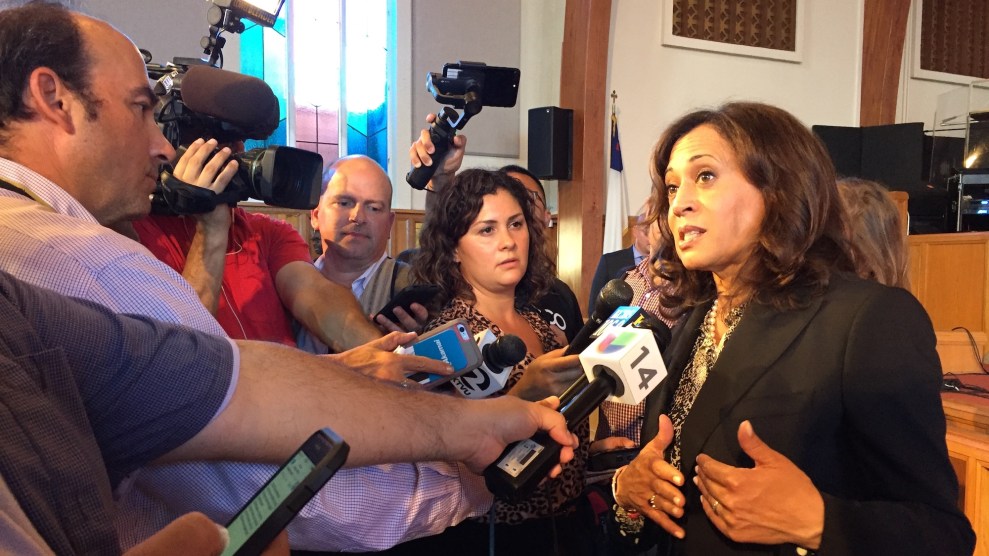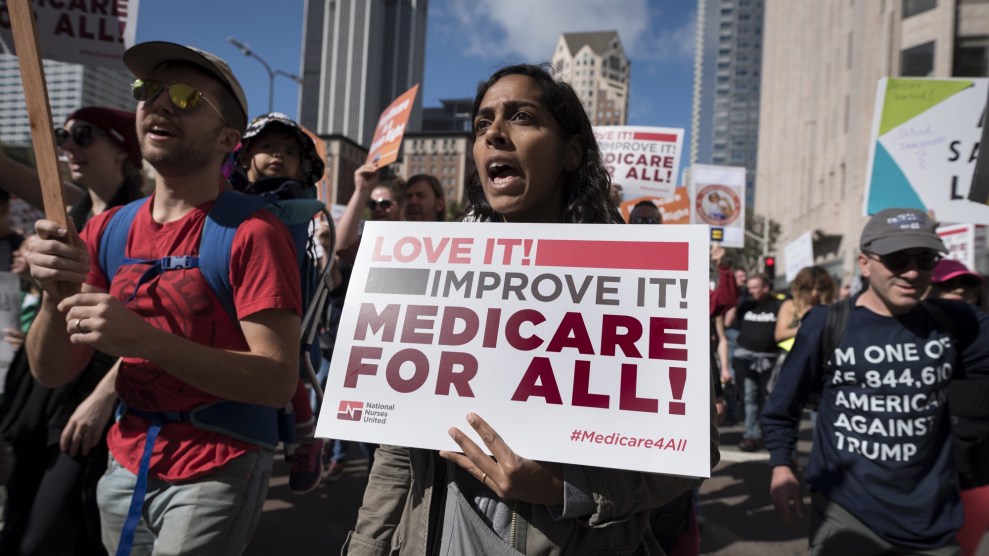
Of the many public takedowns of RoseAnn DeMoro, the boss of the largest nurses’ union in America, one of the funniest is a campy YouTube video called “The Devil Wears Scrubs.” The DeMoro character arrives for a job interview wearing a red cape and horns and carrying a toy pitchfork. The interviewer hands her a job description. “Wait a minute!” says devil DeMoro, looking offended. “It says here I’ll be expected to engage in underhanded and covert activities, including potentially unduly influencing other unions’ elections, union raids, and member intimidation.” She would also have to lie, misrepresent her union activities to the press, “and basically try to force every state nurses’ association in the country to follow our political agenda even if they disagree with it.”
“Uh, yeah,” the interviewer replies. “Is that going to be a problem?”
DeMoro, gripping her pitchfork, puts a finger to her chin and grins malevolently. “Are you kidding?” she says. “I live for that shit!”
In her two-plus decades as head of the California Nurses Association (CNA)—and more recently its affiliate National Nurses United (NNU), with 150,000 members in 50 states—DeMoro has become an angel in the eyes of her supporters and a demon to her foes. Lawmakers and hospital executives hate her members’ take-no-prisoners tactics, which have included enlisting an actress in a velvet cape to chase and mock GOP gubernatorial candidate Meg Whitman around the state and, during one memorable 2001 demonstration at the offices of an industry group, threatening to collectively pee their pants. Some Hillary Clinton fans blame DeMoro for helping Donald Trump by rallying her members behind Sen. Bernie Sanders and attacking rival organizations for supporting Clinton. Still others hate her for the $450,000 she makes in a year, her foul mouth, and the fact that she’s a career labor organizer who has never worked as a nurse. The devil, it turns out, does not wear scrubs.
But as Trump tries to sabotage Obamacare, DeMoro—pitchfork in hand—is leading the counteroffensive in California, pushing single-payer health care in a campaign she hopes will offer a blueprint for how progressives can defeat the GOP. The battle also pits DeMoro against Democratic leaders who fear the proposed program could trigger a ferocious response from Trump and possibly bust the state budget. But all sides realize it’s a test case that could determine the future of universal health care in America.
In this modern era of polished union bosses, DeMoro, 69, retains an old-school flair, with a classic Norma Rae hairstyle and a disposition more Jimmy Hoffa than Sheryl Sandberg, more “in your face” than “lean in.” “Herb Caen once called me Mother Teresa with brass knuckles,” DeMoro told me recently at her union’s Oakland headquarters. “I don’t know about the Mother Teresa stuff, but I like the part about the brass knuckles.”
I’d arrived at an auspicious moment. The single-payer bill, SB 562, had passed the state Senate on a mostly party-line vote of 23-to-14—but several weeks before our meeting, Assembly Speaker Anthony Rendon, one of the state’s top Democrats, had blocked it from proceeding because he believed it was “woefully incomplete.” DeMoro took this as an act of war. “You don’t deny people health care,” she told me, “and think there won’t be repercussions.”
If DeMoro is a throwback, so is the CNA’s growth curve. While most American unions were hemorrhaging, “the nurses,” as members call themselves, increased almost sixfold, from 17,000 in 1993—the year DeMoro took charge—to about 100,000 today. Part of that expansion involved wresting thousands of members from rival unions, but DeMoro attributes her success to her union’s steadfast commitment to caregivers and patients. Beyond pushing for stricter nurse-to-patient ratios and other professional prerogatives, the CNA’s activities include rallying to address climate change, providing disaster relief, and lobbying legislators to fight for the state’s lower drug costs. The nurses endorsed a universal health care bill in 1994 and two subsequent single-payer bills that passed the Legislature only to be vetoed by Gov. Arnold Schwarzenegger. The latest attempt, SB 562, was a strategic response to Republican attacks on Obamacare and Medicaid. “The best way to fight,” says Chuck Idelson, DeMoro’s longtime communications chief, “is to have an alternative.” And his boss’ choice of battles reflects her philosophy that, as she puts it, “you cannot be a patient advocate and not be a social advocate.”
The first time DeMoro ever felt energized by a political candidate was during Bernie Sanders’ 1981 run for mayor of Burlington, Vermont. She was just an impoverished graduate student studying sociology at the University of California-Santa Barbara, working on the side as a grocery store clerk, but she managed to cough up a $20 donation. Now she counts herself as Sanders’ longtime friend and ally—”I feel like a part of his family.” After quitting grad school, DeMoro worked as an organizer for the Teamsters before landing, in 1986, a gig as the assistant director of collective bargaining for the CNA, then run by administrators and executives. When the union’s management asked members to embrace heavier patient loads, DeMoro and 12 fellow organizers were fired for drumming up opposition. A coup ensued—CNA veterans call it “the revolution.” The suits were ousted and the organizers were reinstated. Nurses loyal to DeMoro were promptly elected to the CNA’s board of directors, which proceeded to name her executive director.
On her watch, the CNA racked up a string of victories—including the first-ever state law capping patient-to-nurse ratios. In 2005, when Schwarzenegger tried to repeal it, the nurses fought back viciously and won, trailing him all the way to Ohio to picket. But a decade later, after Sanders chose DeMoro to help write the party’s platform with the Democratic National Committee, she was blocked by party officials who allegedly said they “didn’t want any more labor representatives.” DeMoro’s take: “I just don’t think they wanted this labor representative.”
Her icy relationship with top Democrats has emboldened her to attack any politician she deems insufficiently supportive of single-payer—including Assemblyman Rendon, who, as DeMoro likes to point out, has received more than $100,000 from Big Pharma and $55,000 from health insurers, while the state Democratic Party has collected more than $4.3 million in similar donations. “I’ve never seen such a denial of democracy,” she says.
DeMoro doesn’t want the party to squander a historic opportunity—a supermajority in the Legislature at a time when Trump outrage is at a fevered pitch: “We have this organic convergence that would make the time for single-payer precisely perfect,” she says. If Rendon had let SB 562 proceed, “California could’ve been just golden. It could’ve been leading the nation.”
It still may. Not long after visiting the nurses’ headquarters, I attended a CNA conference, where Sanders was slated to discuss the single-payer bill he’d introduced in the US Senate a week earlier with the nurses’ endorsement. “When the US joins the rest of the industrialized world in guaranteeing health care to all through a single-payer system,” Sanders later told me, “it will be fully recognized that RoseAnn and NNU were leaders in helping make that happen.”
The mood was feisty in the San Francisco Marriott ballroom where roughly 1,000 attendees gathered. Most, like 90 percent of the CNA’s rank and file and 31 of its 32 directors, were women. “I think we’re closer now than we’ve ever been,” board member Maureen Dugan, who briefed the crowd on contract negotiations with the University of California system, told me later. “The day is gone where you can say you support single-payer. Show me!”
But enacting single-payer requires broad-based coalition-building, to which DeMoro’s confrontational methods may not be well suited. “Using fear and intimidation as a tactic in the Legislature usually doesn’t get you too far,” Mike Madrid, a Republican strategist, recently told the industry publication California Healthline. Sherry Bebitch Jeffe, a professor of public policy at the University of Southern California, doesn’t see it that way. Win or lose, she says, DeMoro “moves the needle on what is politically possible.”
The devil, of course, is in the details. California’s bill, as written, could cost a whopping $400 billion per year, though supporters are quick to point out that the state currently spends about $260 billion on health care, and 3 million state residents are uninsured. At least half the funding for the new measure could be covered by shifting money now spent on Medicare, Medi-Cal, and other state health services to the single-payer program. The state could fund the rest by enacting two new taxes, according to a study commissioned by the CNA—a 2.3 percent tax on business revenue exceeding $2 million and an equivalent spike in sales tax—combined with credits for low-income families. The political gamble, apart from the fact that insurance companies are powerful and tax increases are unpopular, is that the Trump administration could try to withhold hundreds of billions of dollars in federal funds from the new program. That could doom universal health care in California and throw Medi-Cal and Medicaid into disarray, risking coverage for millions of people.
DeMoro doesn’t know if the president would go that far, but she has never been one to shy away from a standoff. Such a crisis might even work in her favor by forcing moderates to pick a side. “We need to be more than anti-Trump,” she told me. “There’s a reason why the Republicans were able to get traction against the Affordable Care Act. It’s unaffordable, and the quality of care isn’t what it should be.”
According to recent studies and polls, 67 percent of Californians (and 60 percent of all Americans) said they thought the government should guarantee universal health care coverage. And the vast majority of California nurses want single-payer. DeMoro’s primary mission is to make sure politicians heed those voices—and take action. “It’s their job to at least try,” she said.
But when I ask her what’s next, DeMoro drops a bombshell. “I wanted to retire when we got single-payer passed,” she says, but “any day now” she plans to turn the reins over to her second-in-command, Bonnie Castillo.
A nurse for 33 years, Castillo lacks her boss’ foulmouthed charisma. It remains to be seen whether she’s capable of filling the unusually large shoes of DeMoro, whose influence on nurses—and state politics—has, for better or worse, been indelible. “RoseAnn has steeled us,” Castillo said when I asked whether she’s up to the challenges ahead. DeMoro taught them “how to take a stand on behalf of our patients, and you know what? It may not be ladylike.”













